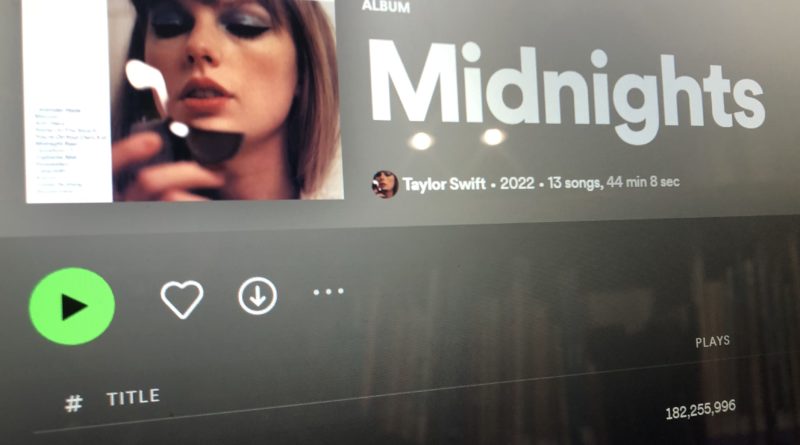Taylor Swift Returns to Pop Era With Vulnerability in “Midnights”
Upon first listen, I was intrigued by the use of voice effects and the new sound that Taylor Swift utilizes in her newest album, “Midnights.” So much so that it took three listens for the weight of her lyrics to sink in, but when they did, they showed how unguarded Swift was when writing about the stories shared in these new songs.
Swift has been on the music scene since 2006 when she released her self-named debut album. She has been prominent in the music industry since, having released ten albums over her 14-year career. Her more famous songs include “Shake It Off,” “Blank Space,” “Look What You Made Me Do,” “All Too Well” and “Love Story.”
While Swift has written pop-leaning albums in the past, “Midnights” incorporates a more raw, alternative feeling than her previous work. Elements in songs like “Lavender Haze” can be related to “Wildest Dreams,” which both have a slow beginning with lots of bass and move into an airy, lighter sound as the song progresses.
The overall theme for “Midnights” is emotional depth. Swift utilizes the vulnerability she felt during emotional portions of her life to create the songs on this album. They are raw, and each tells a different story.
The lyrics of “Midnights” contain some of my favorite lines Swift has ever released. She describes situations that are easily relatable, while remaining specific to her own life. In “You’re On Your Own, Kid,” Swift sings, “I hosted parties and starved my body, like I’d be saved by the perfect kiss,” depicting an experience that many young people can relate to: wanting to change yourself for the acceptance of others.
Along the same lines, in the song “Labyrinth,” Swift writes, “Breathe in, breathe through, breathe deep, breathe out,” showcasing the reminders she needed to give herself as she explains her fear of falling in love too quickly. These lyrics serve as reminders for listeners, and the lyrics found throughout the album are extremely applicable to a number of situations, making “Midnights” a very relatable album.
“You’re On Your Own, Kid” is the song that sticks out to me most. Swift’s fanbase is generally younger, so the scenarios described in this song evoke feelings that make the listener feel comfortable in those experiences. In the beginning of the song, there is a negative connotation surrounding the line, “you’re on your own, kid,” relating it to not being noticed by a crush or feeling stuck in life. As the song progresses, positivity is found in the distinction between loneliness and being alone with Swift telling the listeners “you can face this.”
Swift’s latest release has a mix of upbeat, positive songs and sad, introspective ones. “Bigger Than the Whole Sky,” shows a story of loss and how it affects those who have endured it. The song is assumed to be about someone in Swift’s life whose death has affected her tremendously, and she is learning how to live with the grief it caused.
Swift writes sad songs, but she less frequently writes songs pertaining to death and grief. The feeling that “Bigger Than the Whole Sky” gives is similar to that of “Ronan” off of her 2012 album, “Red.” That song followed the death of a young boy diagnosed with neuroblastoma and was written using quotes from his mother’s blog posts. The similarities between the themes of these songs makes “Midnights” feel even more like Swift’s older work.
While I enjoy the majority of songs on “Midnights,” there are a couple of weaker moments that did not have the same effect as the rest. I found that “Sweet Nothings” is repetitive to the point of annoyance, and “Dear Reader” has auto-tune that makes the lyrics feel disingenuous.
I love this album and the pop-alternative direction she chose to take with it. While it is hard to rank Swift’s albums since they all take on a different genre, “Midnights” is close to the top of my favorite Taylor Swift albums thus far in her ever-evolving career.

